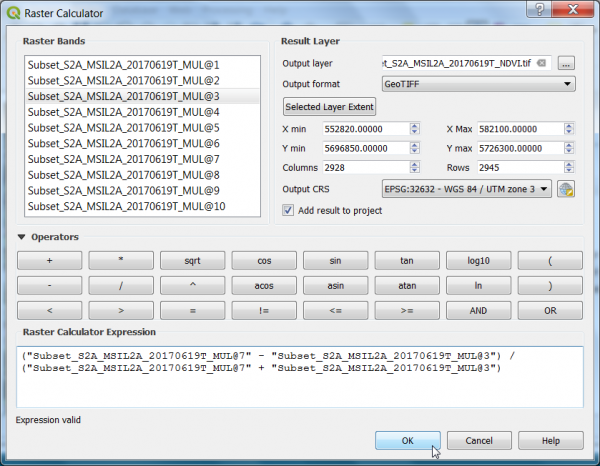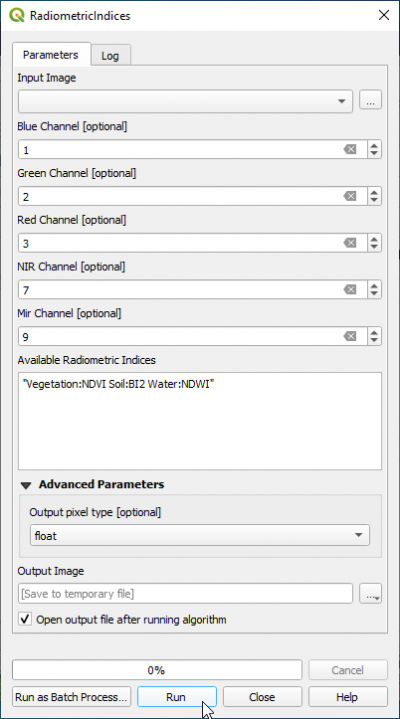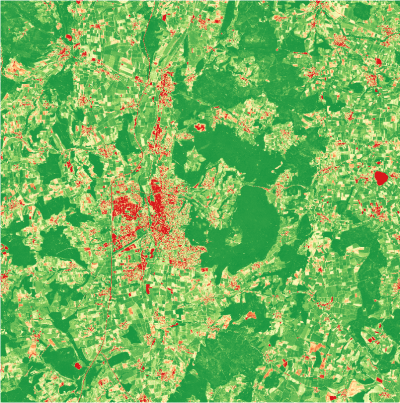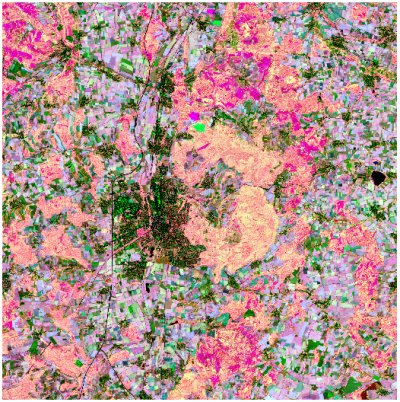Spectral indices
From AWF-Wiki
(Difference between revisions)
(→Several spectral indices at once using Processing Toolbox) |
(→Several spectral indices at once using Processing Toolbox) |
||
| Line 25: | Line 25: | ||
{| class="wikitable" | {| class="wikitable" | ||
| − | | style="border: 0pt" | [[file:Qgis_ndvi_pseudo.png|thumb|left|400px|'''Figure A:''' | + | | style="border: 0pt" | [[file:Qgis_ndvi_pseudo.png|thumb|left|400px|'''Figure A:''' Single band '''NDVI''']] |
| − | | style="border: 0pt" | [[file:Qgis_vi_composite.png|thumb|left|400px|'''Figure B:''' | + | | style="border: 0pt" | [[file:Qgis_vi_composite.png|thumb|left|400px|'''Figure B:'''Spectral composite (RGB = NDVI,NDWI,BI2)]] |
|} | |} | ||
[[Category:Working with Raster Data]] | [[Category:Working with Raster Data]] | ||
Revision as of 10:49, 17 November 2020
Spectral vegetation index using Raster Calculator
- Click the Open Data Source Manager
 and then Add raster layer
and then Add raster layer  and select the file /geodata/lucc/s2/Subset_S2A_MSIL2A_20170619T_MUL.tif.
and select the file /geodata/lucc/s2/Subset_S2A_MSIL2A_20170619T_MUL.tif.
- Check the rank and spectral range of bands in the multiband file (e.g. see table Changing Raster Layer Style).
- After clicking Open, the raster layer appears in the QGIS canvas.
- Click Raster --> Raster calculator.
- A powerful normalization is realized by the normalized difference vegetation index that forms the basis of most vegetation indices $NDVI = (Nir - Red) / (Nir + Red)$. It can be implemented using Raster Calculator as seen in the following screenshot:
- Define path and file name of the output layer. OK.
- Map visualization: Open the raster layer properties by right-clicking the ndvi raster in the TOC selecting Properties, or by simply double clicking.
- Select the Style tab. Under Render type select Singleband pseudocolor.
Several spectral indices at once using Processing Toolbox
A convenient module for calculating one or several spectral indices at the same time can be found in the QGIS processing toolbox.
- Type Radiometric into the search field and find the OTB --> Feature Extraction --> Radiometric Indices) tool.
- Open it with a double click.
- Assign the bands in the multiband file to the correct spectral sensitivity.
- If you want to calculate a single spectral index type in the text field Available Radiometric Indices: "Vegetation:NDVI"
- If you want to calculate several spectral indices at once and store them in a multiband file click Help to find definitions of available spectral indices in three categories (vegetation, water, soil) and relevant channels of the input multiband image.
- Click Run.
- In the text field Available Radiometric Indices type with apostrophs:
"Vegetation:NDVI Water:NDWI Soil:BI2"



